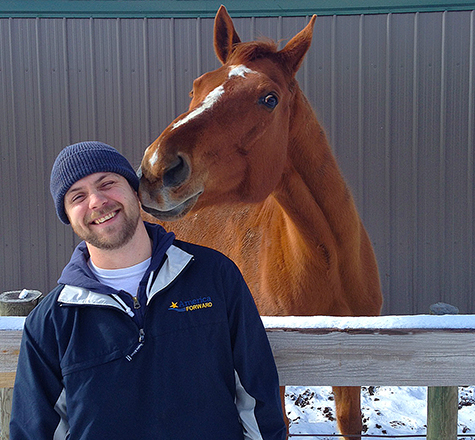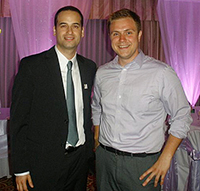
Smith, who is studying global leadership and management in University College, the professional and continuing education division of Arts & Sciences, is leading a team of engineers to produce low-cost prosthetics using solar-powered 3D printers.
His initiative, which has received support from WUSTL’s Skandalaris Center for Entrepreneurial Studies and the Department of Electrical & Systems Engineering in the School of Engineering & Applied Science, may one day help countless amputees in developing nations.
Pereira is in the University College Honors Program and founder of the Pathfinder Initiative, a program that teaches veterans to train therapy horses for disabled children. He received a Social Venture Challenge grant at the Clinton Global Initiative University at Washington University last spring.
“Today’s veterans have come back with more experiences and capabilities and a strong sense of patriotism,” said Smith. “I’m not talking about nationalism but a desire to serve by helping our community.”

Pereira and Smith are two of some 100 veterans who receive free or reduced tuition to attend Washington University through the G.I. Bill or Yellow Ribbon Program. These veterans attend both undergraduate and graduate programs, studying law, engineering, business, science, communications and other disciplines.
“Veterans bring a lot of experiences and knowledge, but we are not the only ones who have something to offer,” Smith said. “The people I have met here are amazing. I have had opportunities and been exposed to ideas that I would not be able to get anywhere else.”
Smith could not have imagined this future years ago when he was a struggling high school student in Paradise, Calif., a small town in the foothills of the Sierra Nevada Mountains.
“My high school diploma was technically a favor from the principal to my mom,” Smith said.
He joined the Army in 2000 and distinguished himself as intelligence analyst in Iraq in a region soldiers called the Triangle of Death.
“It lived up to its name. I lost a good number of the people in my unit,” Smith said. “From my first day on, it was just a tragic slog through bodies.”
In 2006, four soldiers from Smith’s unit burned the home of a Sunni family. The war crime horrified the nation and inspired the book Black Hearts: One Platoon’s Descent into Madness in Iraq’s Triangle of Death.
Smith had had enough, but because of the military’s stop-loss policy, he continued to serve until 2009. He was convinced he would die during his second tour; instead he scored a huge personal victory — helping to transform a corrupt Iraqi National Guard unit into a unified peacekeeping force.
“We were told it was a lost cause, but six months after our arrival, we were fighting shoulder to shoulder,” Smith said. “We taught them how they could protect themselves and their families better. That was the ying to the yang of the previous experience.”
The Mission Continues
Smith returned to the States and started community college in Nashville. He had a girlfriend and a job delivering pizza. He told himself everything was good.
“Only it wasn’t,” Smith said. “I realized I wasn’t sleeping and I was angry all of the time and I didn’t know why.”
Pereira, who had not seen Smith for years, came for a visit and immediately identified Smith’s problem — post-traumatic stress disorder. Smith refused to believe it.
“I was like, ‘Yeah, whatever,’” Smith said. “I’m a rear-echelon guy. I’m not an infantry dude. I didn’t hold my buddy in the dirt while he was dying.”
But Pereira persisted and convinced Smith to move to St. Louis where he worked at The Mission Continues, the nonprofit group that organizes service projects for veterans. Smith pitched in at one project, trimming hedges and painting rooms at Edgewood Children’s Center.
“I slept better that night than in the two years I had since leaving the military,” Smith said. “The night was pivotal because I realized that I was unhappy because I lacked a sense of purpose.
“It’s really easy to get trapped in the mindset that civilians are very selfish creatures who live to make money,” Smith said. “I couldn’t see the purpose to that sort of life. But doing something for a currency different than the dollar finally brought me some peace.”
Smith took a fellowship at The Mission Continues organizing service projects across the nation. During that time, Smith first visited Washington University where he worked with Brown School researchers.
Eight tons of support
and counting
Read about the WUSTL Military Care Package group that continues to send a taste of home to troops overseas.
They wanted to know if community service helps veterans transition back to civilian life. The answer — absolutely. A recently published Brown School Center for Social Development study of 400 veterans shows community service improved a veteran’s job prospects, relationships with his or her family and health.
From there, Smith was chosen for an internship with Joining Forces, First Lady Michelle Obama’s program to create jobs for veterans. He managed challenges big and small from helping a deployed soldier’s wife pay for a plumber to negotiating with the American Logistics Association to create 140,000 jobs for veterans.
Smith came back and enrolled in University College. Pereira also had enrolled. The two friends started to share ideas about social entrepreneurship. Pereira discovered the healing power of horses after observing them work with disabled children.
“At first it broke my heart, but then it rebuilt it,” said Pereira, who has helped some 300 children. Smith is one of his volunteers.
Smith started to play around with the idea of using a solar-powered 3D printer to manufacture a prosthetic socket — the piece of the prosthetic limb that fits over the remaining limb — from complex and interlocking plastic parts. From that, a hand or foot can be attached. Don’t ask Smith exactly how it’s done; he’s not an engineer. But he doesn’t need to be.
“That’s why I chose the global management program — I’m not an engineering expert, but what I can do is bring people together and have them serve a common purpose,” Smith said. “That’s my contribution.”
University College Dean Robert E. Wiltenburg, PhD, is amazed by Smith and other veterans who have come to Washington University for a better life, not just for them but for the world around them. The cumulative effect will be powerful, Wiltenburg said.
“When you look back historically, returning veterans of World War II had a transformative effect on the society they came back to, often in ways nobody predicted at the time,” Wiltenburg said. “We are seeing that now. We will look back 15, 20 years from now and say the same thing. These men and women are bringing back more than we ever know.”